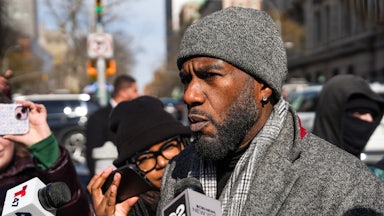Two months ago, the Republican Party was headed to what looked like a historic wave election. The Democrats had spent months in disarray; their legislative agenda, stuck in the mud, looked unlikely to get unstuck before the midterms. Crises had bogged down the administration, from the botched withdrawal from Afghanistan to the omicron Covid wave to Vladimir Putin’s invasion of Ukraine. Joe Biden’s approval rating had been falling precipitously since August 2021—by mid-July it was lower than Donald Trump’s during the same period in his presidency, an ominous sign. To top it all off, inflation was at levels not seen in decades—and the economy appeared to be heading into recession. With the Democrats controlling razor-thin majorities in both the House and the Senate, it seemed inevitable that Republicans would take control of both chambers of Congress come January by commanding majorities.
With this abundance of lemons, the GOP made lemonade, hammering its rivals on inflation and blaming Democrats for runaway spending and the economy. Democrats were made to endure a barrage of attack ads focused on the high price of gas—which hit an average of more than $5 a gallon in June—as well as other household goods, particularly food. Fearmongering staples such as immigration and crime have also featured heavily—as has Biden’s lingering unpopularity. The overall message was hammered home again and again: Democratic leaders were asleep at the wheel, pushing policies that made the direst crises the country was facing worse rather than better.
Over the last few weeks, however, the vibe has shifted. Democrats are surging and brimming with confidence. While their chances to retain their majority in the House of Representatives remain quite low—FiveThirtyEight currently weights them at about one in five—Democrats are rising in the generic ballot. Meanwhile, Republicans are trailing in several key Senate races, including Pennsylvania, Georgia, Wisconsin, and Arizona. All of a sudden, it’s the Republican Party that looks diminished. And while you can chalk some of this up to the Democrats catching a few breaks, the GOP has some self-inflicted wounds to rue as well.
What’s changed? Democrats have been aided considerably by the Supreme Court’s repeal of Roe v. Wade, which is both deeply unpopular and speaks to the GOP’s increasing radicalism. The ongoing January 6 committee hearings and the more recent seizure of classified documents from Trump’s Florida abode have reminded voters both of the former president’s hold over the Republican Party and its growing authoritarianism. The economy has not only continued to add jobs but has shown few signs of an imminent recession. Gas prices have plummeted. The Democrats have passed several key pieces of legislation, including a pared-down spending bill that funds green energy, tax enforcement, and prescription drug cost savings. And while Biden’s approval numbers haven’t rebounded as much as he’d like, judging from the generic ballot, many voters appear to have separated him from his party; more now want Democrats to retain control of Congress even though they don’t particularly care for the president.
“I think there’s probably a greater likelihood the House flips than the Senate,” Mitch McConnell told Senate Republicans last week, according to NBC News. “Senate races are just different—they’re statewide; candidate quality has a lot to do with the outcome.” McConnell continued: “Right now, we have a 50–50 Senate and a 50–50 country, but I think when all is said and done this fall, we’re likely to have an extremely close Senate, either our side up slightly or their side up slightly.”
But unforced errors from Republicans are aiding the Democrats as well. The GOP’s midterm message has shrunk, thanks in large part to gas prices dropping, the success of the economy, and Democratic momentum. Whereas months ago, Republicans had hoped to coast into majorities by hammering the cost-of-living crisis, that’s gotten more difficult as prices have dropped. Republicans have, moreover, failed at any point to offer any concrete plans for what they would do if they did take power, or what solutions they would offer. The closest the party came to offering a platform was National Republican Senatorial Committee Chair Rick Scott’s “Eleven Point Plan to Rescue America”—a manifesto packed with incredibly unpopular ideas, such as sunsetting all laws passed by Congress after five years (which would eliminate Medicare and Social Security), which landed with a splat with his Republican colleagues. Compounding this error, Scott is now under fire for wasteful spending of the GOP’s campaign kitty—which to be honest is probably the sort of thing you might expect to happen when you hand the purse strings to a guy best known for doing fraud.
The lack of a Republican message has left a vacuum that’s now being filled by increasing amounts of attention to the party’s struggling candidates, nearly all of whom were handpicked by Donald Trump. There’s Dr. Mehmet Oz in Pennsylvania, an out-of-state automaton who doesn’t understand basic concepts like “grocery shopping.” Blake Masters in Arizona, who seems to have been grown in one of Peter Thiel’s labs. In Georgia, former NFL star Herschel Walker is a reliable fountain of bizarre and disqualifying remarks.
It’s not clear that the GOP had a plan for the possibility that Democrats might catch some breaks or the economy might improve. It hasn’t unleashed a new policy proposal that’s passed the popularity test or could be said to address a real problem. The January 6 commission and the recent raid at Mar-a-Lago are reminding voters of Republicans’ lawlessness and contempt for democracy. The party is becoming known for book bans, the fomenting of political violence, and chaos promotion. There is, of course, plenty of time for that to change—the midterms are just more than two months away. But it’s increasingly looking like the midterms won’t be a historic wave election—and Republicans only have themselves to blame.










